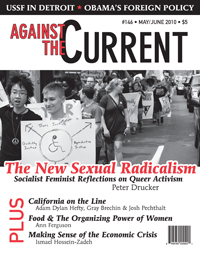Against the Current, No. 146, May/June 2010
-
Who's Dysfunctional Now?
— The Editors -
U.S.-Israel Crisis: The Test
— David Finkel, for the ATC Editors -
Race & Class: Obama & the Politics of Protest
— Malik Miah -
U.S. Social Forum in Detroit
— Dianne Feeley -
The Death of NUMMI
— Barry Sheppard -
Obama's Imperial Continuity
— Allen Ruff -
Ohio Socialist Runs for U.S. Senate
— Dan La Botz -
Islamophobia Sets the Terms
— Alex de Jong -
Food Sovereignty in Mexico & The Organizing Power of Women
— Ann Ferguson -
The New Sexual Radicalism
— Peter Drucker -
Making Sense of This Economic Crisis
— Ismael Hossein-zadeh - California Crisis Hits, Fightback Erupts
-
Public Education in California--What's After March 4?
— Adam Dylan Hefty -
Teachers, Parents, Community Together
— interview with Joshua Pechthalt -
Republic of Dunces
— Gray Brechin -
Undisputed Success
— Claudette Begin - Reviews
-
Myths of the Exile and Return
— David Finkel -
Terror As It Was and Is
— Aparna Sundar -
Philippines: Resisting Gobble-ization
— Michael Viola -
Sacred Roots of A People's Music
— Kim D. Hunter -
Discography to Sacred Roots of A People's Music
— compiled by Kim D. Hunter - Dialogue
-
On the Legacy of Che Guevara
— Charlie Post -
An Answer to Charlie Post
— Michael Löwy -
Reply to A Reviewer
— James D. Young -
Response
— Paul Buhle
Charlie Post
PETER DRUCKER’S LETTER (ATC 144) commenting on Kit Wainer’s review of Besancenot and Löwy’s new biography of Che (ATC 143) rehearses many of Besancenot and Löwy’s arguments that Che’s Marxism was some sort of alternative to Stalinism. I, for one, am no longer convinced by these claims.
Drucker objects to Kit’s characterization of Che’s politics as a variant of “third period” or radical Stalinism. He point to Che’s rejection of “a stagist strategy” and championed “internationalist solidarity; the link between collective transformation and individual ethics, and the relationship between economics and politics in the transition to socialism.” All of these are not unique to Che, and are typical of bureaucratic ideology and regimes during their “left phases.”
During the classical “third period” — the years between 1928 and 1934, when the Communist International proclaimed that proletarian revolution was imminent around the world– Communist parties effectively abandoned “stagism” in practice, if not in theory. The first manifestation of the new ultra-left political orientation came in China, where the Comintern ordered the Chinese Communists to abandon their alliance with the pro-capitalist Goumindang, and launched minoritarian insurrections across China in 1928.
In Germany and the rest of the developed capitalist world, the Communist parties rejected any “stagist” defense of the democratic gains of the working classes in favor of preparing for the immanent proletarian revolution that would inevitably follow what they expected would be the short-lived victory of fascism (“after Hitler, our turn!”)
The experience of Maoism prior to its rapprochement with U.S. imperialism in the early 1970s is another example of how radical Stalinists abandoned the rhetoric of “stagism” and embraced forms of bureaucratic “internationalism.” Their ultra-left rhetoric, especially compared with the staid politics of the Soviet bureaucracy, was the basis of the appeal of Maoism to many young radicals in the 1960s.
In terms of issues concerning “the link between collective transformation and individual ethics, and the relationship between economics and politics in the transition to socialism,” Che’s thinking is quite similar to that of the ideologues of breakneck industrialization in both Russia in the 1930s and China in the 1950s and 1960s. In both cases, increased exploitation of workers — long hours, low wages and rations, and intensified labor — and forcing the bulk of the peasantry into the cities fueled bureaucratic industrialization.
In both cases, the bureaucracy rejected “material incentives” — improvements to workers’ living standards which would have slowed the pace of industrialization — in favor of “moral incentives,” ultra-voluntarist appeals for workers to work longer and harder for less. It is difficult for me to see the differences between Soviet rhetoric about Stakhanovism — rate-busting “model workers”– and Che’s appeals to a new “socialist man” who responds to moralistic appeals.
Peter Drucker’s concerns about whether Kit Wainer’s stance would lead us to equate Lenin and Trotsky with Stalin, and reject the contributions of Marxists such as Mariategui, Lukacs and Gramsci are misplaced.
Lenin and Trotsky’s role in undermining Soviet Democracy 1918-22 marked a sharp change in their politics and strategy before the Revolution, and their attempts (however flawed initially) to revive workers’ democracy in the 1920s and 1930s. Che always rejected the equation of socialism with the democratically organized power of the working class.
Unlike Mariategui, Lukacs and Gramsci, Che did not embrace the possibility that workers — especially in the developed capitalist countries — could make their own revolution and build a society in their own image.
Can even we learn from past revolutionaries even if much of their legacy is problematic? Absolutely. But what we learn from them depends upon the political context. Within the new left forces in Latin America today (or in the “post-Seattle” U.S. left to which Drucker refers), few have learned the lessons of Stalinism.
We still see uncritical adoration of great leaders such as Morales and Chavez, and much of the left still equates “anti-imperialist” struggle with defense of the policies of the Bolivian and Venezuelan states. In short, the weaknesses of Guevarism are still a major problem for us. This is why we can’t just join the celebration of Che’s legacy but emphasize the “humanist” side of it.
Finally, it is truly unfortunate that Drucker promotes the hoary old myth that Marx “failed to integrate…ecology” into his vision of socialism. John Bellamy Foster’s Marx’s Ecology: Materialism and Nature (Monthly Review Press, 2000) should have put that claim to rest a decade ago.
ATC 146 web edition only, May-June 2010

